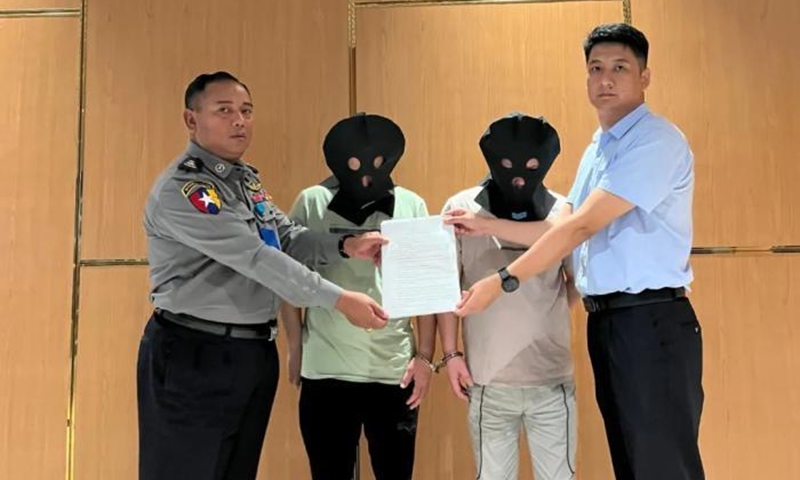Joint patrol with neighboring countries necessary and crucial in cracking down on cross-border telecom fraud: Chinese experts

As telecom fraud has become increasingly rampant along the southwestern border of China, multiple regions in Southwest China's Yunnan Province have launched a new round of intensive anti-fraud campaigns. Officials warned that if individuals are lured to scam dens on the border, they may be sold "like pigs" and subjected to torture, or even face life-threatening situations.
To combat cross-border crime, the Mekong River joint patrol consisting of law-enforcement authorities from China, Laos, Myanmar, and Thailand are actively taking action, which experts said are necessary and crucial in cracking down on illegal activities, given the complex security situation in border areas and the high mobility of criminal gangs.
With the exposure of a series of scams under the guise of high-paying overseas jobs and the surprise hit movie No More Bets revealing the inner workings of online gambling fraud, the topic has drawn widespread attention among the Chinese public and particularly from public security services in Yunnan, which neighbors Myanmar, Laos and Vietnam and has been one the main locations of these crimes.
According to data released by Yunnan's capital city of Kunming, from January to December 2022, the proportion of fraud cases involving overseas phone numbers accounted for 22 percent of the total in the city. So far in 2023, these cases have reached 14 percent of the total.
Various localities in Yunnan have issued warnings in recent days, noting that once people are smuggled to foreign countries, it is not well-paid jobs that are waiting for them but scam dens, where they will be forced to engage in illegal activities. Personal freedom is certainly restricted, and they will be required to complete large amounts of fraud tasks every day. Failure to complete the tasks may result in torture such as forced fasting, electric shocks and beatings.
If they want to return to China, they are required to pay exorbitant "compensation" and "ransom" up to millions of yuan; if they fail to complete their tasks, they may be sold "like pigs" and even face life-threatening situations, said the warnings.
A Chinese national who has been living in Myanmar for almost 10 years told media on Wednesday that Chinese students studying abroad have become the new targets for scams, as they may not have timely access to the latest information at home and in turn have lower vigilance against scam calls.
Joint patrols with neighboring countries were launched on Tuesday as a fleet consisting of five law-enforcement vessels - three from China, one from Laos and one from Myanmar - departed from the Jingha Port in Yunnan as part of efforts to combat cross-border crimes arising from gambling scams in the Mekong River basin, the Xinhua News Agency reported.
Six suspects of telecom fraud were handed over by Myanmar to the Chinese police at Yangon International Airport and escorted back to China on Wednesday. One of the suspects is a key figure in a gambling fraud syndicate and a prime target in the crackdown, media reports said.
In June, the first batch of six suspects involved in fraud cases in Myanmar were returned to China.
Experts noted that as transnational gambling fraud is even more lucrative than drug trafficking and very difficult to eradicate, it is necessary and crucial for countries in the region to collaborate in targeted operations.
Wu Fei, an expert on Southeast Asia studies, pointed out that some fraud groups are scattered in remote areas of northern Myanmar and have connections with gangs involved in the "Golden Triangle" drug trade, making it more difficult to combat them. After they establish a foothold in underdeveloped regions, these fraud groups can "stimulate" local economies and thus prompt the protection and even involvement of local officials, Wu told the Global Times on Wednesday.
As many hideouts are located in border areas with strong mobility and networks in Southeast Asia, it is extremely challenging for a single country to conduct operations such as victim rescue or gathering information about crime hotspots, Wu noted.
The importance of combating cross-border fraud and related crimes lies not only in maintaining a country's image but also in ensuring the development of tourism and international trade.
This is particularly concerning as the tourism industry is a vital sector for many Southeast Asian countries, the expert said.
What's more, the worrisome security situation may also hamper the timely restoration of people-to-people exchanges in the post-pandemic period, causing unnecessary misunderstandings and conflicts.
The Chinese, Thai, and Laotian ambassadors to Myanmar held a trilateral meeting to coordinate efforts in combating gambling fraud, according to a notice issued by the Chinese Embassy on Tuesday.
The three parties unanimously agreed that the current prevalence of gambling fraud in the region seriously undermines the safety of people's lives and property. They are fully coordinating with Myanmar authorities to conduct investigations and rescue operations, as well as assisting Myanmar in intensifying efforts to combat fraud syndicates.